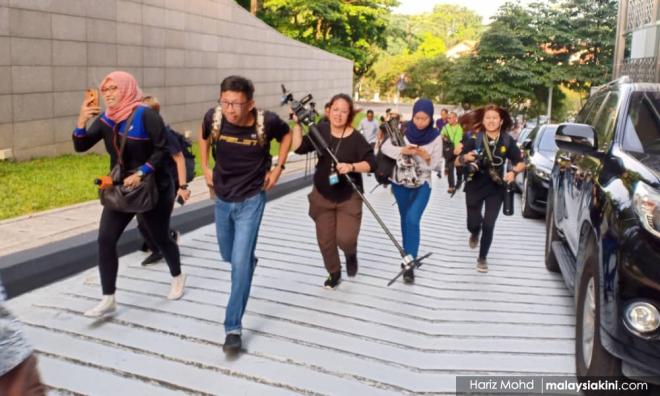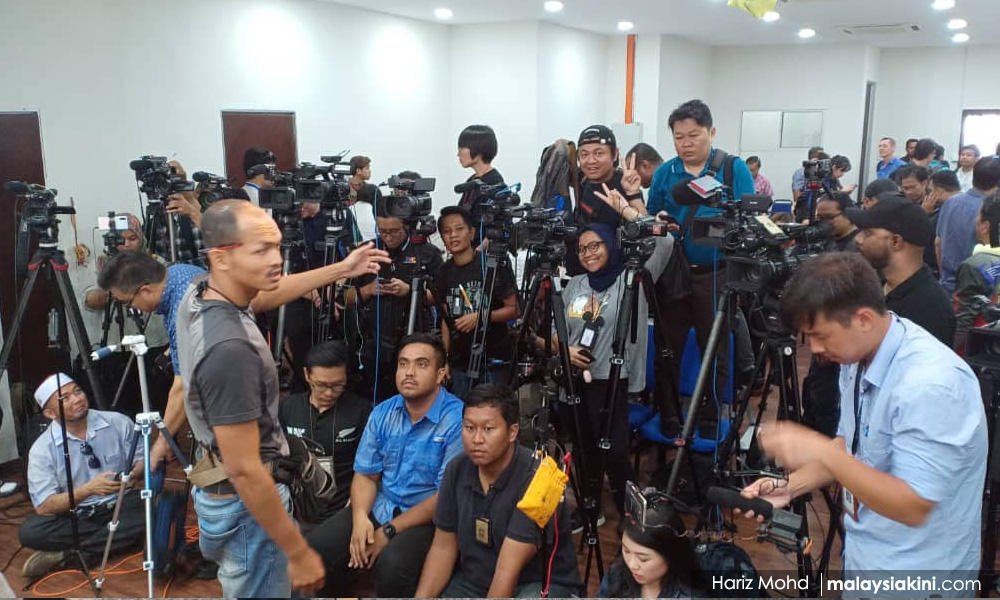
The last few months have been some of the most demanding for the media. From mass retrenchments of those working in print media, to camping outside the Istana Negara as one political drama after another unfolds, to sitting in socially distanced lines at press conferences - I can only imagine the state of chaos we would fall into without the media.
Yet, the ability of the media to adapt to bring us the news is not something new.
I remember being with a radio station that, I am sure with other media platforms as well, worked around the clock to crunch analysis after analysis during the annual budget season.
I remember as my colleagues in print media geared up with all their plastic-covered equipment and just a single backpack for themselves to cover areas struck by disasters during monsoons. "Kita basah takpe, equipment tak boleh kena air" (We can get wet but not our equipment) - I remember them saying.
I don’t know if people realise this or not, but some members of the media also needed to don protective gear and then quarantine themselves away from their families because they have been covering the Covid-19 crisis.
And then there are all the night shifts, covering everything from traffic accidents to murder scenes.
Malaysia's media future is something we really need to think about seriously.
The welfare of media members must be prioritised and those who have lost their jobs must be fairly compensated.
The plight of the thousands who lost their jobs from Utusan and Media Prima last year has fallen silent and we don’t know if they have received their months of owed salaries and compensations.
There are members of the media who have worked for decades and still only earn a minimum wage - this must change.
Almost all, if not all media platforms were already tightening their belts when the Covid-19 pandemic hit, and it broke my heart to hear that Blu Inc has also now closed its doors.

Yet, most people remain unaware of the dangerous exposure that our media friends go through and few members of the media speak about it outside their own close circles.
Sexual harassment remains a big deal in the media. This is not a new thing and it is still something that is not being taken seriously enough.
I remember being teased by a minister about my name and my looks when I was a rookie journalist and was almost paralysed with helplessness with what I should do. The power dynamics between this big-time minister and this junior reporter was too great and there was little I could do than to force a smile and look away.
There was a time when if this incident was reported to the editor, they would just tell you that this "norm" comes with the territory of being a journalist. To a large extent, this is still being told to women journalists everywhere on top of being objectified for their looks and especially if they appear in front of a camera.
But there has been pushback. More women members of the media are speaking out about their experiences with sexual harassment and what is needed is for them to be believed and action to be taken against perpetrators.
Complaints of sexual harassment, no matter who it comes from, must be taken seriously. This applies everywhere.
Let's not even get started with all the hate speech that media members receive. Even this opinion columnist, and let me tell you, I have received some really colourful ones.
The bottom line is this: You have all the right to disagree. You do not have the right to be rude about it.
What we sadly see is how selective reality has become over the acceptability of what is being said. Depending on where you sit on the political spectrum, there are blurring lines between free speech and hate speech – and this is not right.
In a nutshell, the truth must be allowed to be spoken and justice must be upheld. Free speech is not an excuse to start flexing your racism, sexism, homophobia, xenophobia and all the other -isms.
The Media Council is a step in the right direction to raise the standard of media integrity, but the council must be empowered, and draconian laws such as the Printing Presses and Publications Act 1984 and the Sedition Act must be abolished.
For the last few years, we have been stretching the boundaries of free media in this country and honestly, this is the right thing to do. One huge contributing factor to this is the Internet.

I know what many are thinking: This is how the evil liberal west poisons our innocent minds and tarnishes our fragile eastern values! Proponents to this forget, however, that knowledge is power.
They also sorely underestimate the human ability to learn and decide for themselves what is best for them.
On the contrary, exposure to the media is not the reason why some people think that our morals are diminishing. Instead, the tightening grip of conservatism and the shielding of people from knowledge is what is eroding our values.
Of course, now we have social media and what an amazing avenue it is to expose naughty ministers. And why should the media or anyone be afraid of the truth? The law is (supposed to) apply to everyone equally. No one is (supposed to be) above the law.
I wonder how many people realise the difficult editorial process that a story still goes through. No, one cannot simply write whatever they want and get it printed. The vetting for political correctness and political acceptability is still something that happens today.
The media must not be frightened into publishing only news that is politically acceptable. Freedom is not the enemy. Injustice is.
Even in a small, second degree way, I am glad that I am still part of the media world. I am proud of the work that my media friends do. To all of you, Happy World Press Freedom Day. The world would be a much darker place without you.
MAJIDAH HASHIM is a human rights defender. She can be reached via Twitter at @majidahhashim - Mkini


No comments:
Post a Comment
Note: Only a member of this blog may post a comment.